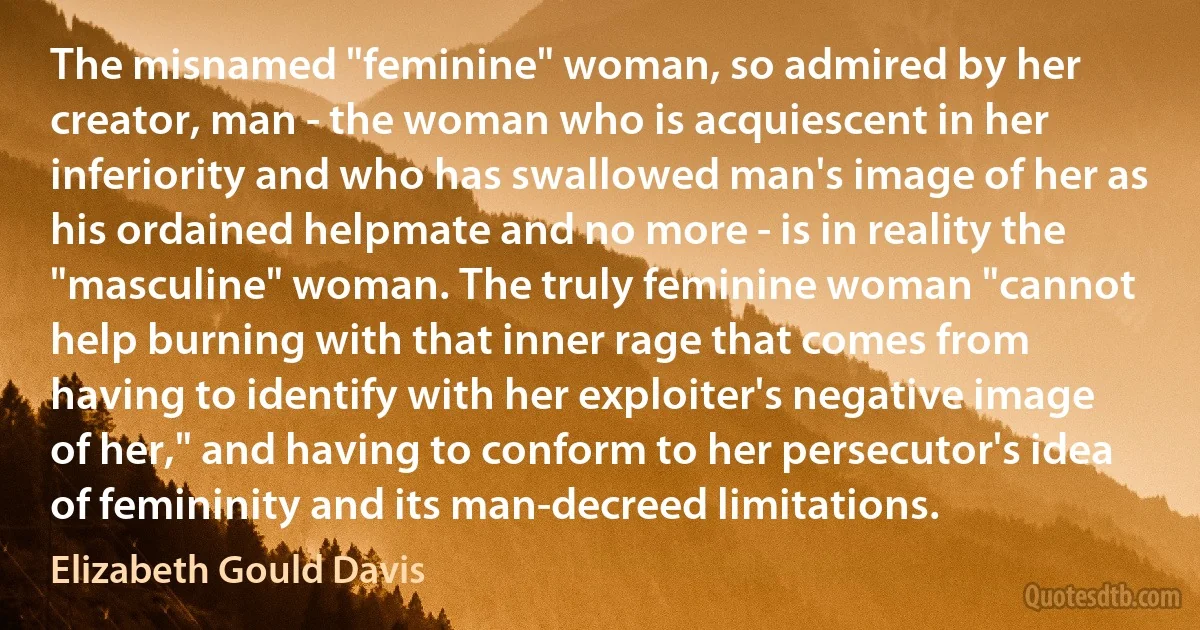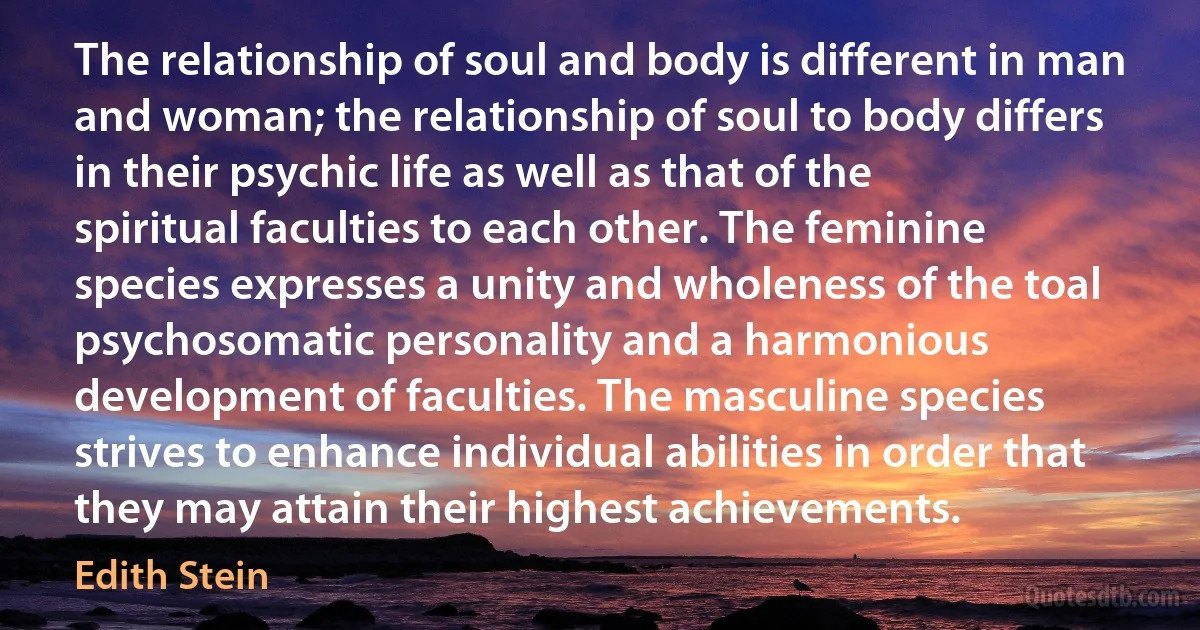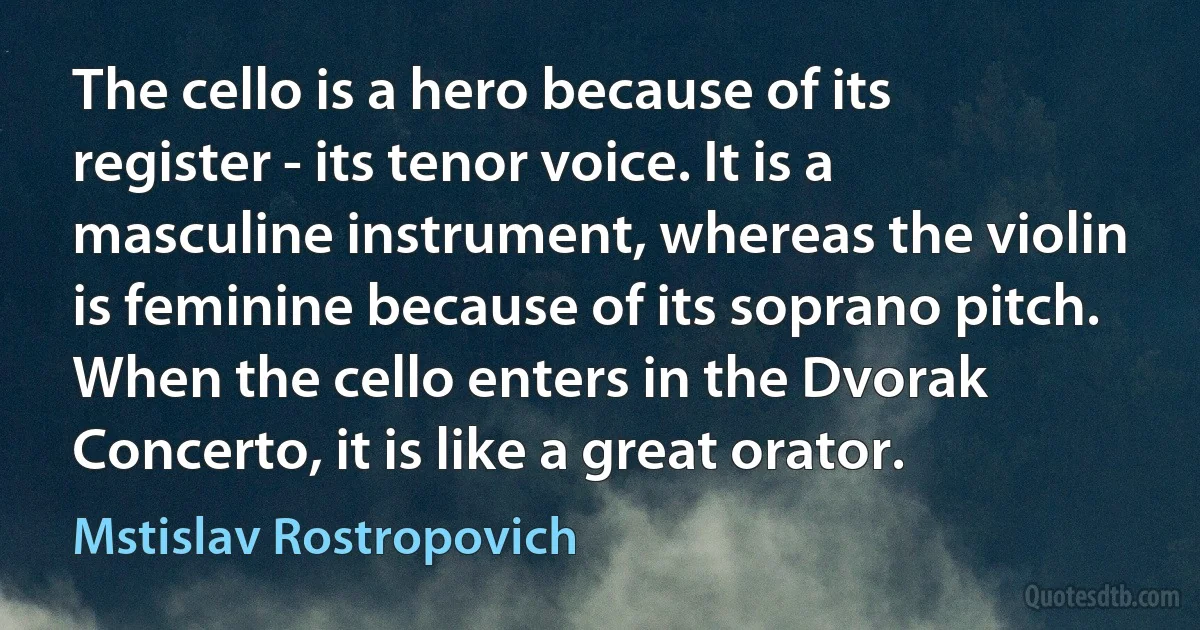Masculine Quotes - page 5
p>Romanticism is no sign of powerful instincts, but, on the contrary, of a weak, self-detesting intellect. They are all infantile, these Romantics; men who remain children too long (or for ever), without the strength to criticize themselves, but with perpetual inhibitions arising from the obscure awareness of their own personal weakness; who are impelled by the morbid idea of reforming society, which is to them too masculine, too healthy, too sober.

Oswald Spengler
The embodiment of the unconscious of a woman as a figure of the opposite sex, the animus, also has positive and negative features. The animus, however, does not express itself so often in women as an erotic fantasy or mood, but rather as "sacred" convictions. When these latter are expressed loudly and energetically in a masculine style, this masculine side of a woman is easily recognizable. However, it can also manifest in a woman who appears very feminine externally as a quiet but relentless power that is hard as iron. Suddenly one comes up against something in her that is cold, stubborn, and completely inaccessible.

Marie-Louise von Franz
In real life, too, it takes a long time for a woman to bring the animus into consciousness, and it costs her a great deal of suffering. But if she succeeds in freeing herself from his possession, he changes into an "inner companion" of the highest value, who confers on her positive masculine qualities such as initiative, courage, objectivity, and intellectual clarity. Like the anima in a man, the animus also commonly exhibits four stages of development. In the first stage he manifests as a symbol of physical force, for example, a sports hero. In the next stage, in addition he possesses initiative and focused ability to act. In the third stage, he becomes "the word" and is therefore frequently projected onto noteworthy intellectuals, like doctors, ministers, and professors.

Marie-Louise von Franz
Nor, on the other hand, are there any masculine charms [in Gabriele Münter's work] either: no 'sinewy brushwork', no heaps of paint, 'hurled on to the canvas'. The pictures are painted throughout with a delicately and correctly sensed measure of external strength, with not a trace of feminine or masculine coquetry in the 'making'. We could almost say that they are painted modestly; i. e. that they were inspired, not by a desire for outward display, but by a purely inward compulsion.

Wassily Kandinsky
Even Plato assumes that the genuinely perfect condition of man means no sex distinction (and how strange this is for people like Feuerbach who are so occupied with affirming sex-differentiation, regarding which they would do best to appeal to paganism). He assumes that originally there was only the masculine (and when there is no thought of femininity, sex-distinction is undifferentiated), but through degeneration and corruption the feminine appeared. He assumes that base and cowardly men became women in death, but he still gives them hope of being elevated again to masculinity. He thinks that in the perfect life the masculine, as originally, will be the only sex, that is, that sex-distinction is a matter of indifference. So it is in Plato, and this, the idea of the state notwithstanding, was the culmination of his philosophy. How much more so, then, the Christian view.

Søren Kierkegaard
Helene Lange throughout her life insisted that the dissimiliarity of the sexes must be emphasized in order that the feminine nature be freely developed and properly formed. Only then might this nature achieve its own cultural fulfillment, an achievement indeed necessary in our time as a suitable compensation for the obvious effects of our masculine Western culture; then feminine nature might be capable of authentic human formation and an activity of helping love.

Edith Stein
Christ embodies the ideal of human perfection: in Him all bias and defects are removed, and the masculine and feminine virtues are united and their weaknesses redeemed; therefore, His true followers will be progressively exalted over their natural limitations. That is why we see in holy men a tenderness and a truly maternal solicitude for the souls entrusted to them while in holy women there is manly boldness, proficiency, and determination.

Edith Stein
What I want in a woman is protection. Loyalty. Companionship. Loyalty, friendship, companionship, ferociousness. I want her to protect me, and have my back to the bitter end. If I have a fight, I want her to jump in. Even if I'm winning; even if she's ninety pounds. I like strong women-not necessarily a masculine woman-but I like strong women. I like strong, say a woman who runs a C. E. O. corporation. I like a strong woman with confidence-massive confidence-and then I want to dominate her sexually.

Mike Tyson
As regards the individual nature, woman is defective and misbegotten, for the active power of the male seed tends to the production of a perfect likeness in the masculine sex; while the production of a woman comes from defect in the active force or from some material indisposition, or even from some external influence...On the other hand, as regards human nature in general, woman is not misbegotten, but is included in nature's intention as directed to the work of generation. Now the general intention of nature depends on God, Who is the universal Author of nature. Therefore, in producing nature, God formed not only the male but also the female.

Thomas Aquinas
BB: Are there any men in?
(no response)
BB: Any women?
Female voices: Yes!
BB: Ah, you see, there's this crisis in masculine identity at the moment. Women, totally at home with their sexuality. 'I am woman, wo-man, I, wo-MAN.' Men 'Er.. (awkward expression) Someone else'll shout out, I'll be alright'. Alright, is there any blokes in?
Masculine voices: Yeah!
BB: You see, there's a term that men feel more comfortable with. Bloke, blokey bloke bloke. It's a kind of friendly term. 'Oh, he's a bloke, lovely bloke, nice bloke, blokey bloke. I'm a bloke, you're a bloke, wahey!' It doesn't impose any unnecessary demands on us as men. 'Bloke', that's just basically 'carry stuff, don't get in the way'. 'Man', that's all kinds of other things, isn't it? That's nobility, gallantry, wisdom... that conjures up some image of a bloke in a cardigan with a pipe saying 'Cover up those table legs, mother, they're inflaming my sexual ardour'.
Ch. 24, 53:21.

Bill Bailey
All of us have masculine and feminine qualities-some of this is genetic, and some of it comes from the profound influence of the parent of the opposite sex. But in the need to present a consistent identity in society, we tend to repress these qualities, overidentifying with the masculine or feminine role expected of us. And we pay a price for this. We lose valuable dimensions to our character. Our thinking and ways of acting become rigid. Our relationships with members of the opposite sex suffer as we project onto them our own fantasies and hostilities. You must become aware of these lost masculine or feminine traits and slowly reconnect to them, unleashing creative powers in the process. You will become more fluid in your thinking. In bringing out the masculine or feminine undertone to your character, you will fascinate people by being authentically yourself. Do not play the expected gender role, but rather create the one that suits you.

Robert Greene
Without that forward-going, courageous consciousness, a woman herself will drift into unconsciousness and terror. It's the sleep of the naive and damned. She needs to wake herself up and bring her own masculine consciousness into the forefront so she can survive in the world. Unless woman is taken out of man, then she isn't a human being – she's just a creature.

Jordan Peterson



